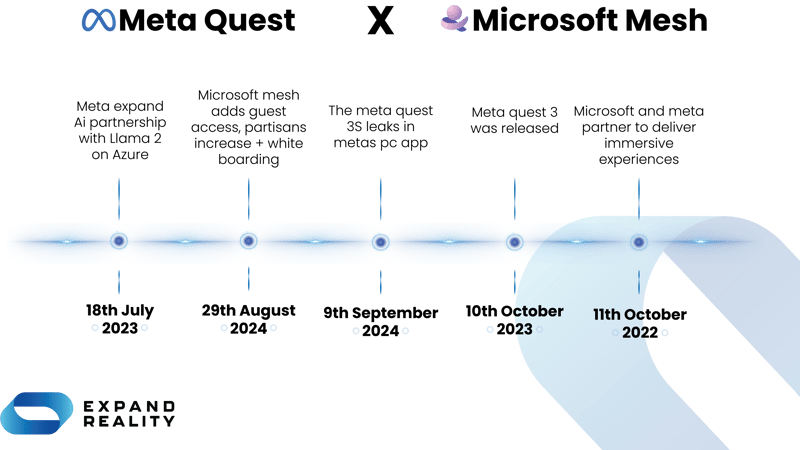
This synergy between Meta Quest headsets and Mesh for Teams is enhancing productivity and engagement in virtual reality workspaces. The Microsoft-Meta partnership is poised to transform the way teams collaborate, merging the power of Teams with Meta Quest to create more immersive, interactive, and effective communication. As the metaverse continues to evolve, the collaboration between Meta and Microsoft could redefine how businesses and users leverage virtual reality and mixed reality tools for remote work, team collaboration, and immersive events.
Key trends shaping this movement include VR-based collaboration, the expansion of the metaverse, and the role of Mesh in revolutionising Microsoft Teams. These innovations are setting new benchmarks for hybrid and remote work environments, offering new opportunities for engaging and productive virtual meetings and events.
Meta and Mesh Timeline
The growing excitement surrounding Meta and Microsoft Mesh underscores the increasing convergence of virtual reality (VR) and collaborative digital spaces, driving innovation within the metaverse and beyond. Meta's progress with the Meta Quest headsets, particularly the Meta Quest 3, is sparking a surge of interest in immersive experiences. Meanwhile, Microsoft Mesh is revolutionising virtual collaboration by integrating with Microsoft Teams, allowing users to engage in mixed reality environments from anywhere in the world.
This collaboration between Meta Quest headsets and Mesh for Teams is elevating productivity and engagement in virtual reality workspaces. The Microsoft-Meta partnership has the potential to reshape how teams collaborate, merging the capabilities of Teams meetings with Meta Quest to create more immersive, interactive, and efficient communication. As the metaverse continues to expand, this partnership could redefine how businesses and users adopt virtual reality and mixed reality tools for remote work, team collaboration, and immersive events.
Key trends driving this movement include VR-based collaboration, the growth of the metaverse, and the transformative role of Microsoft Mesh in Teams. These advancements are setting new standards for hybrid and remote work environments, with the Mesh toolkit enabling businesses to create custom experiences. Additionally, features such as avatars for Teams and immersive collaboration are fostering enhanced interaction among colleagues within immersive spaces, providing new avenues for productive and engaging virtual meetings in Mesh environments.
Meta and Mesh: An annotated timeline
11th October 2022 - Microsoft and Meta partner to deliver immersive experiences for the future of work and play
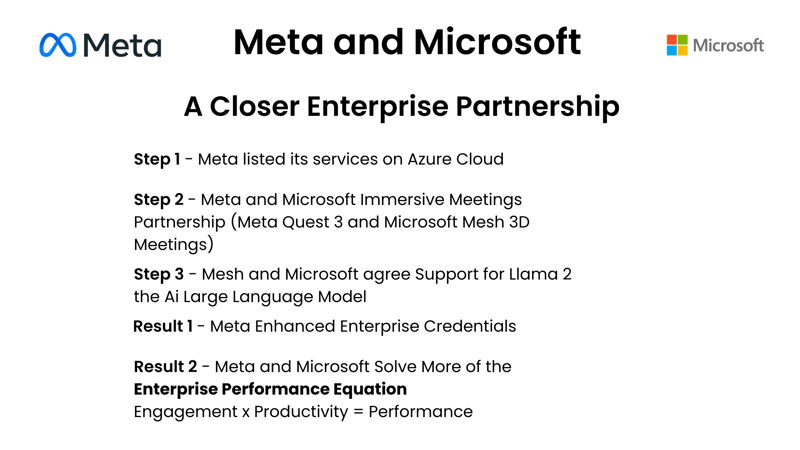
On 11th October 2022, Microsoft brought Mesh for Microsoft Teams to Meta Quest devices, marking a significant milestone in enhancing virtual collaboration. Mesh for Teams builds on Microsoft's extensive research and innovation within the Microsoft Cloud ecosystem. This powerful platform is designed to facilitate seamless virtual gatherings, enabling people to connect and collaborate in a shared space, regardless of their device—whether it’s a smartphone, laptop, or mixed-reality headset like the Meta Quest Pro and Meta Quest 2.
With Mesh for Teams, the virtual experience is elevated as users can interact within immersive 3D spaces, bridging the gap between remote and in-person collaboration. The integration of Meta Quest devices enables more lifelike connections, allowing people to meet, brainstorm, and problem-solve as though they are physically together. This brings new levels of engagement to virtual meetings, making it especially valuable for businesses looking to enhance their Microsoft ecosystem with the next generation of hardware and virtual experiences.
For clients in sectors such as architecture, engineering and design spread across multiple locations, this combination of Mesh for Teams and Meta Quest provides a groundbreaking platform for collaborative work.
Microsoft Mesh further enhances this by enabling the creation of custom virtual environments and providing tools for more interactive content sharing. Whether it's working on a complex project with a client or having a casual office catch-up, Mesh for Teams supports a wide range of virtual interactions. The collaboration is set to redefine how businesses use VR technology for content creation, remote support, and even social networking, as platforms like Facebook continue to evolve alongside the office and work-from-home trends.
15th November 2023 - Microsoft conducted research using a combination of surveys to understand how Copilot is transforming work
%20.png?width=800&height=450&name=Copilot%20vs%20free%20lunch%20stats%20(LP)%20.png)
Microsoft's Copilot for Microsoft 365 is already transforming the workplace, delivering measurable productivity gains and fostering creativity. Surveys and observational studies reveal that 77% of early users don’t want to work without Copilot. Key benefits include significant time savings—users report an average of 1.2 hours saved per week—while enhancing work quality and creativity. In fact, 68% of users noted improvements in their work, and 57% felt more creative. Copilot supports a wide range of tasks, such as drafting documents, summarising meetings, and retrieving information. In specific studies, users completed tasks like drafting and summarising in Microsoft Teams up to 29% faster.
Notably, 85% of users said Copilot reduced the effort required to complete tasks, and 86% found it easier to catch up after meetings. Additionally, Copilot improves email communication, with messages rated 18% clearer and 19% more concise. The organisational impact is also profound—Copilot for Sales enables sales teams to work more efficiently, while Copilot for Security boosts cybersecurity task accuracy by 44%.
Beyond productivity, data shows Copilot is reshaping how people value workplace tools, with 77% of users preferring Copilot over perks like free lunches. This AI-driven tool is not only increasing individual output but also elevating organisational efficiency. It is helping transform business processes in areas like customer service, sales, and finance by streamlining workflows and enhancing decision-making.
With tools like the Mesh toolkit and support for custom environments powered by Unity, businesses can expect more immersive, interactive workflows.
20th April 2023 - The New Performance Equation of AI
.png?width=800&height=450&name=microsoft%20performance%20equation.pdf%20(1).png)
Employee engagement is becoming increasingly crucial for business success, particularly during times of economic uncertainty and the transition to flexible working models.
Engaged employees are more proactive, innovative, and committed to their organisation’s success. Microsoft’s research shows a direct link between high employee engagement and better financial performance, with companies that emphasise engagement achieving stronger portfolio returns compared to those with disengaged workforces.
Key insights indicate that engaged teams perceive their organisation as having strong communication, exhibit higher confidence in leadership, and have well-defined goals. Conversely, disengaged employees often face confusion about priorities and a lack of trust in leadership. Effective communication is essential for talent retention, as employees in low-engagement environments are twice as likely to leave due to poor communication.
Microsoft’s Work Trend Index underscores the significance of utilizing modern tools and AI-driven analytics to enhance employee engagement. By integrating employee feedback with productivity metrics, collaboration data, and sentiment analysis, organisations can establish a "feedback flywheel"—a continuous loop of feedback and improvement. This strategy ensures that employee insights lead to actionable changes, fostering a more innovative and productive work environment.
To sustain engagement, organisations should set clear priorities, equip leaders with effective communication tools, and leverage AI for actionable insights. Implementing solutions like Microsoft Mesh for immersive spaces, with features such as avatars and 3D models—facilitated by Unity—can enhance collaboration and interaction. These mixed reality experiences and face connections offer a more dynamic and engaging way for employees to join meetings and collaborate.
As AI continues to transform workforce dynamics, businesses that prioritise employee engagement will gain a competitive edge in both financial performance and the job market. Emphasising well-being, involving employees in decision-making, and fostering engagement will lead to improved business outcomes, enhanced customer satisfaction, and long-term success.
18th July 2023: Meta expand ai partnership with Llama 2 on Azure
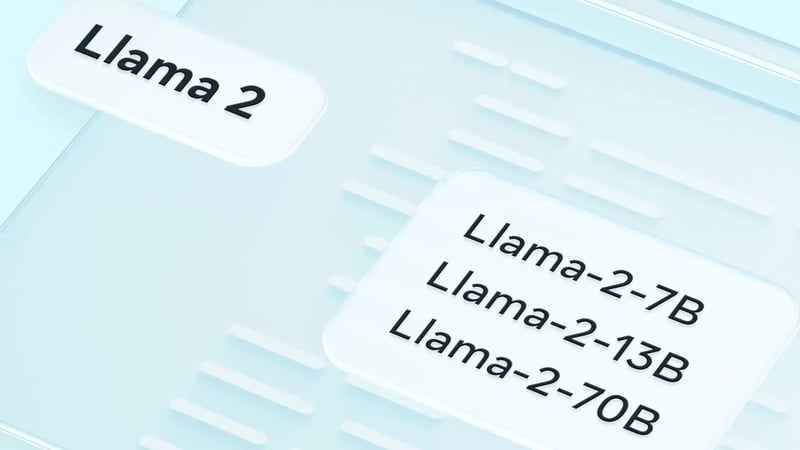
Meta and Microsoft have taken a significant step forward by announcing support for the Llama 2 family of large language models (LLMs) on Azure and Windows. This collaboration aims to empower developers and organisations to build generative AI-powered tools and experiences that can revolutionise how businesses interact with technology. With Llama 2, Meta has adopted an open approach to AI, allowing developers greater flexibility in the types of models they work with, while Microsoft emerges as a key partner in bringing this AI technology to a wider audience.
This collaboration is set to accelerate the development of AI-driven applications that boost productivity and communication, particularly through platforms like Microsoft Teams. The integration of Microsoft Mesh and Llama 2 opens up new possibilities for hybrid meetings, immersive spaces, and more interactive virtual environments.
As VR technology advances, the synergy between Microsoft Mesh, Teams, and Meta’s VR headsets, such as the Meta Quest 3, creates opportunities for teams to engage in hybrid meetings where AI can play a pivotal role in real-time collaboration and decision-making. AI-driven models like Llama 2 in these virtual spaces could enhance Teams features by offering more intelligent assistance, crafting customised experiences, and automating routine tasks. This innovation is poised to transform the future of work, enabling Teams users to leverage AI for both everyday tasks and complex workflows.
As companies continue to invest in VR technology and AI, the Meta-Microsoft partnership is likely to shape the future of virtual meetings, providing new opportunities to enhance communication, collaboration, and user engagement in both business and social environments. The evolution of immersive interactions will redefine how teams work together and interact in virtual spaces.
2nd August 2023 - Microsoft’s 2023 Work Trend Index Report reveals impact of digital debt on innovation.
-1.png?width=800&height=450&name=Workday%20(Website)-1.png)
The rapid advancement of AI is set to revolutionise the workplace by addressing challenges such as information overload and digital debt. As data and communication volumes surge, employees are struggling to keep pace, with 64% reporting a lack of time and energy to be creative. This strain impedes creativity, which is crucial for business growth, especially as companies face increasing pressures to boost productivity. Next-gen AI tools like Copilot offer a solution by automating tasks and allowing employees to concentrate on creative and strategic work.
A Microsoft survey of 31,000 individuals found that 70% of employees embrace AI's potential to reduce workloads, particularly in administrative, analytical, and creative tasks. Business leaders are focusing on AI to enhance productivity rather than cut jobs, seeing it as a means to empower employees, streamline workflows, and eliminate low-value tasks. However, successful AI integration requires employees to acquire new skills, such as collaborating with AI, evaluating its outputs, and applying it to complex problem-solving.
Leaders play a critical role in this transition by setting guidelines for responsible AI use, supporting skill development, and deploying AI where it can make the most impact. AI promises to transform the workplace by improving focus, creativity, and productivity. As part of this evolution, tools like Microsoft Mesh and Mesh Webslates will enhance immersive spaces, presence, and joining capabilities, further supporting the integration of AI and redefining how teams collaborate and innovate.
10th October 2023: Meta Quest 3 was released
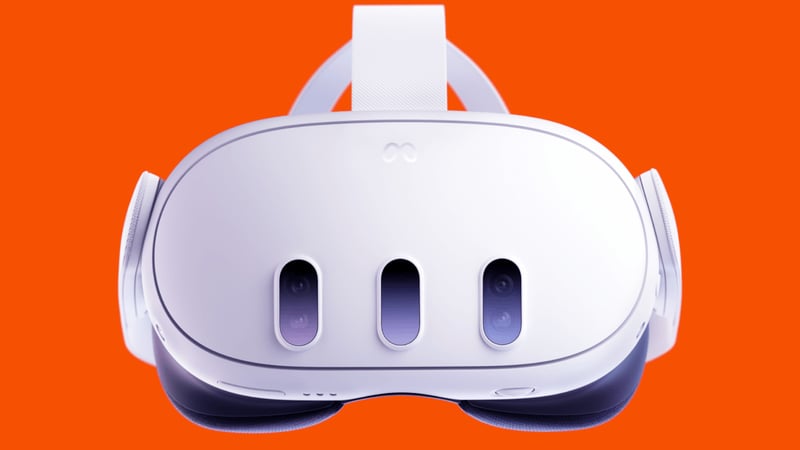
The Meta Quest 3 is a cutting-edge virtual reality (VR) headset developed by Reality Labs, a division of Meta Platforms. Unveiled on June 1st, 2023, and released on October 10th, it serves as the successor to the Quest 2, marking the third generation of the Meta Quest series. This headset showcases significant technological advancements in immersive experiences, bringing VR into the forefront of next-gen computing and collaboration.
With Microsoft Mesh and Mesh for Teams shaping the future of work and communication, the Meta Quest 3 is set to be a crucial device in this transformation. Microsoft has integrated Mesh into Microsoft Teams, enabling virtual meeting spaces where team members can collaborate in both virtual reality (VR) and mixed reality (MR) environments. This integration elevates the Quest 3 from a gaming device to a powerful tool for business particularly within the context of the industrial metaverse.
The industrial metaverse holds significant potential for enhancing collaborative workflows, design, and innovation through immersive technologies like the Meta Quest 3. As businesses navigate the future of work, the Quest 3, combined with Microsoft Mesh for Teams and Mesh Webslates, is at the forefront of transforming how employees engage in virtual meetings, training, and simulations. This synergy is leading the way in reshaping virtual collaboration and immersive experiences.
21st June 2024 - Microsoft Copilot for Microsoft 365
.webp?width=800&height=450&name=Copilot%20Productivity%20and%20Speed%20(LP).webp)
Copilot for Microsoft 365 is transforming productivity in the workplace by leveraging generative AI to automate routine tasks, allowing employees to focus on more creative and complex activities. Integrated into the Microsoft 365 suite, Copilot functions as a digital assistant, learning from user interactions to improve task recommendations and outputs over time. Its capabilities span across writing, designing, coding, and data analysis, streamlining workflows and reducing the time spent on mundane tasks.
One of the key benefits of Copilot is its ability to save time, with 71% of early users reporting increased productivity. By automating processes like generating meeting summaries and facilitating real-time collaboration, it helps teams work more efficiently and reduce miscommunication. This results in faster task completion, particularly in fast-paced work environments.
Looking ahead, Copilot represents a significant shift toward more dynamic and efficient workspaces. Generative AI is expected to not only boost individual productivity but also enhance the overall capacity of organisations. As AI tools like Copilot continue to evolve, they are poised to set new productivity standards, blending technology and human creativity for improved workplace outcomes.
29th August 2024 - Microsoft mesh adds guest access, participant increase + white boarding
.png?width=800&height=450&name=Microsoft%20Mesh%20Joins%20Office%20365%20Roadmap%20(3).png)
One of the most exciting new developments for Microsoft Mesh is the support for Microsoft Whiteboard, which will enable seamless collaboration within Mesh events and likely in Teams Immersive Spaces as well. This integration will work on both PC and Meta Quest devices, making it versatile for various users. The addition of Whiteboard Copilot further enhances this feature by allowing users to leverage AI-powered tools during brainstorming and creative sessions, improving collaboration efficiency. We can expect access to this functionality in November, marking a significant milestone in immersive, real-time teamwork.
Another key update is that the Microsoft Mesh app on PC will now support guests in Mesh events, a game-changer for virtual collaboration. This expands Mesh from a single organisation to a broader audience, enabling users to invite external participants to their Mesh events. Guests will be able to fully engage, participating in discussions, events, and experiences just like the organisation’s internal attendees. This feature opens new possibilities for cross-organisational collaboration, particularly for industries that rely on immersive teamwork.
The long-awaited hand interactions support in Mesh is another standout feature. No longer restricted to using controllers, users can now enjoy more intuitive and natural interactions, such as white-boarding. This enhancement will significantly improve the overall experience of Mesh events and make virtual collaboration feel more seamless.
In addition, Microsoft Teams Chat support will enable participants to communicate across different rooms within a Mesh event. This functionality ensures that all attendees, regardless of where they are within the virtual environment, can stay connected and engage in meaningful discussions.
Moreover, a new environment, The Project Studio, is now available for use in Teams Immersive Spaces and Mesh events. This environment is designed to facilitate project-based collaboration, giving users an immersive and tailored space for specific tasks or creative projects.
2nd September 2024 - Microsoft Mesh release new features
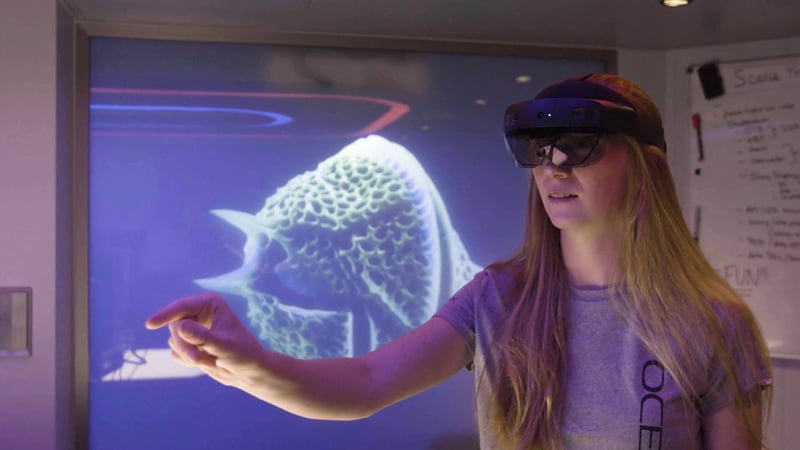
Microsoft Mesh integrates 3D immersive experiences into Microsoft Teams, allowing users to connect and collaborate using 3D avatars in virtual environments. Whether through a PC or a Meta headset, Mesh transforms meetings and events by replicating in-person interactions. This platform supports various collaborative scenarios, from brainstorming sessions to large-scale virtual events, enhancing engagement and presence.
A significant update to Mesh in Teams includes the first preview of Mesh events, now accessible within the Teams app. This integration simplifies participation, allowing attendees to join directly from the Teams web or desktop clients without needing a separate Mesh app. Features like Mac support and a dedicated Mesh app in the Teams client streamline access and event setup.
Organiser tools have been enhanced, providing features like Mute all, Hand-raise control, Megaphone, and multi-room management, improving event flow. The People panel has also been updated, enabling organisers to manage participant engagement and attendance more efficiently. Additionally, support for larger events has expanded, now accommodating up to 330 participants, making Mesh suitable for broader audiences.
Mesh’s toolkit empowers users to create, save, and share 3D environments, while developers and creators benefit from enhanced tools for designing immersive experiences. By breaking down geographical barriers, Microsoft Mesh fosters better collaboration and remote engagement.
This expansion supports Microsoft's vision for a more immersive and dynamic workplace, with Mesh continuing to evolve based on user feedback. It allows organisations to host inclusive and interactive events, helping employees collaborate in engaging virtual spaces while enhancing productivity and reducing the gap between physical and digital interactions.
9th September 2024 - The Meta Quest 3S leaks in Meta’s own PC app
Meta seems to have inadvertently leaked the Meta Quest 3S, a rumoured, more affordable alternative to the Quest 3 headset, through its own Windows Meta Quest Link PC software. This discovery, spotted by UploadVR and shared on Reddit, reveals images of a new VR headset that visually appears to be a blend between the Quest 2 and Quest 3 models. The leak has sparked significant interest as the Meta Quest 3S is expected to offer a budget-friendly option while maintaining many of the key features that make the Quest series so popular in the virtual reality space.
From the images, the Quest 3S may feature a design that simplifies or modifies some of the hardware from its predecessors, making it more accessible for a wider audience.
11th September 2024 - Meta is set to revolutionise the world of mixed reality with its lightweight, glasses-like form factor.
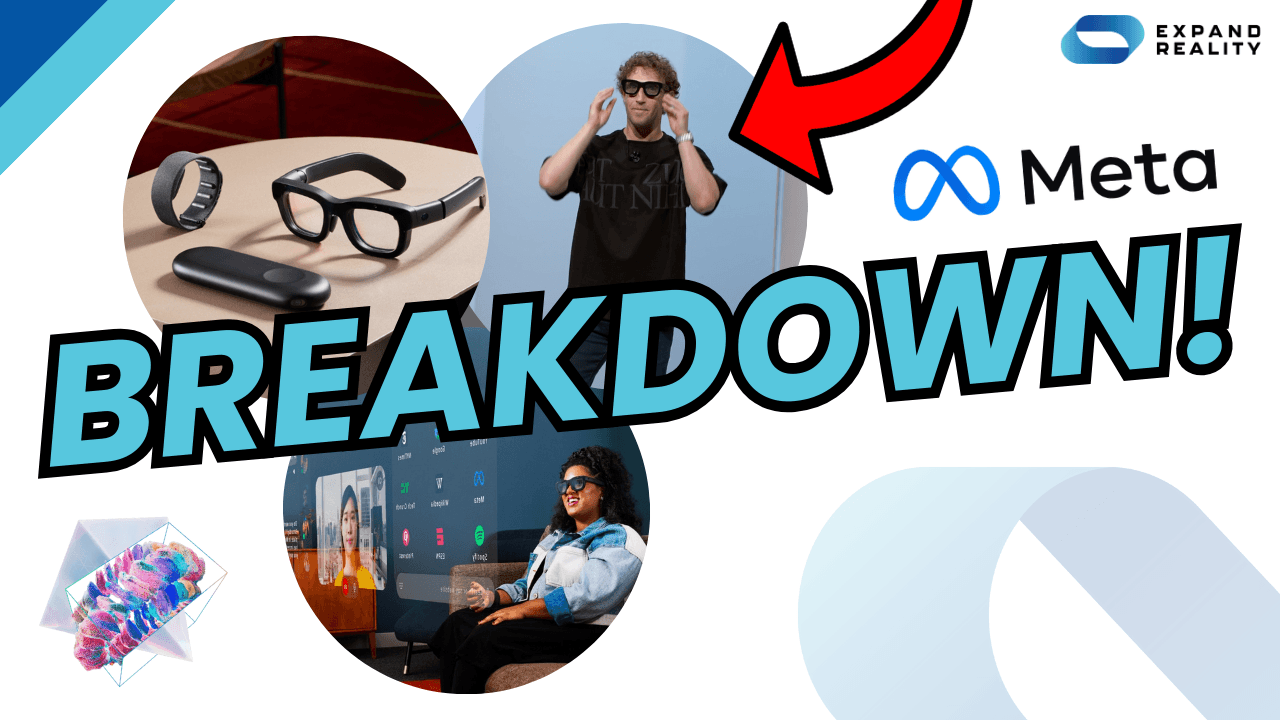
Meta is poised to revolutionise mixed reality with its upcoming lightweight glasses, codenamed 'Puffin.' Unlike traditional headsets, Puffin is designed to be worn like regular glasses, weighing less than 110 grams compared to the 500 grams of current VR headsets like the Meta Quest. This significant reduction in weight aims to enhance comfort and portability for extended use.
Meta's new device represents a departure from existing VR headsets, focusing on a more compact form factor and advanced tracking technologies. The Puffin glasses will offload processing power and battery to a separate pocket computer, allowing for a lighter design. They will also use eye and hand tracking technology for intuitive interaction, unlike traditional headsets that rely on external controllers.
The integration of Puffin with Microsoft Mesh and Microsoft Teams meetings highlights its role in the evolving landscape of digital collaboration. By combining Mesh for Teams with the Puffin glasses, users can engage in immersive virtual environments, leveraging digital avatars and advanced digital environments to enhance meetings and interactions.
Ray-Ban Meta smart glasses already offer a glimpse into the potential of augmented reality with functionalities like capturing photos, making video calls, and streaming audio. These features underscore Meta's commitment to integrating AR technology into everyday life. As Meta continues to advance its mixed reality offerings, including the development of Puffin, it aims to redefine user interaction with digital content and further push the boundaries of VR and AR technology.
With the anticipated release of Puffin around 2027, Meta's focus on lightweight, glasses-like mixed reality devices could spur innovation in the industry, driving the development of more user-friendly and practical smart glasses.
The tipping point
The partnership between Meta and Microsoft is reaching a pivotal moment, driven by the integration of Meta Quest headsets with Microsoft Mesh. This collaboration is ushering in a new era of virtual collaboration, where the merging of VR and productivity tools is becoming an immediate reality rather than a distant prospect. The release of the Meta Quest 3, along with ongoing enhancements to Microsoft Mesh for Teams, is transforming how businesses operate in hybrid and remote settings.
Key innovations, such as immersive virtual meeting spaces, AI-powered tools, and enhanced organizational collaboration, are moving beyond experimental stages to become essential productivity assets. Microsoft's introduction of features like Mesh guest access, hand interactions, and AI-driven white-boarding in August 2024 has significantly advanced the functionality and efficiency of virtual workspaces. Meanwhile, Meta’s advancements with the Quest 3 and the upcoming Quest 3S are set to make high-quality VR more accessible to a broader audience.
This moment is critical not just because of the technological advancements but because Meta is evolving from being known primarily as "Facebook" into a significant player in the enterprise space, thanks to its collaboration with Microsoft Mesh. This shift represents a cultural change in how teams and companies perceive virtual workspaces. With ongoing investments in VR hardware, AI-driven collaboration, and immersive environments, Meta and Microsoft are positioned to lead the next wave of productivity tools, making the metaverse a powerful platform for everyday work and interaction.
Meta Quest 3S useful Links
- Meta Quest 3S features
- Meta Quest 3S cheaper and nearly as good as 3S
- Discover the Meta Quest 3S
- Meta Quest 3S v Meta Quest 2
- Meta Quest 3S price comparison is it worth it?
- Order the Meta Quest 3S
- Meta Quest 3S price revealed
- Meta Quest 3 clock speed
Meta Quest 3 Useful Links
- Quest 3 128gb discontinued in favour of Quest 3S
- Meta Quest 3 connecting it to your pc a quide
- Meta Quest 3 2024 updates
- Meta Quest 3 v Pico 4
- Meta Quest 3 and Windows 11
- Meta Quest 3 collaboration with Photon
- Meta Quest 3 price cut
- Meta Quest 3 remote Desktop Link
- Meta Quest 3 boost productivity
- Meta Quest 3 v PS5
- Meta Quest 3 Beginners guide
- Meta Quest 3 v Meta Quest 2
- Meta Quest 3 v Apple Vision Pro
- Meta Quest 3 v Meta Quest 3S price comparison
- Meta Quest 3S v Pico 4
Enterprise Useful Meta Quest Links
- Microsoft & Meta - Why are the important for businesses
- Meta Quest for Business FAQs
- Meta Quest 3 and Mesh the future of collaboration
- Meta Quest workplace benefits

